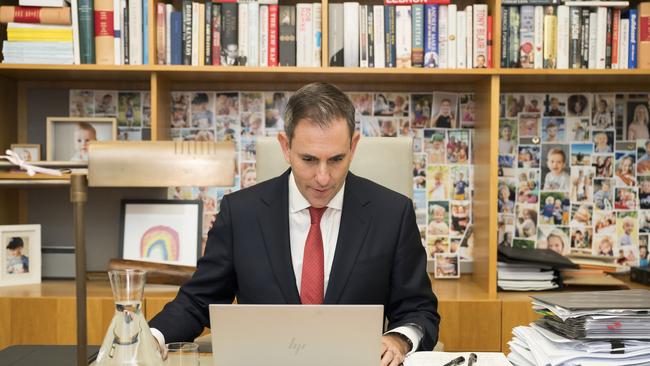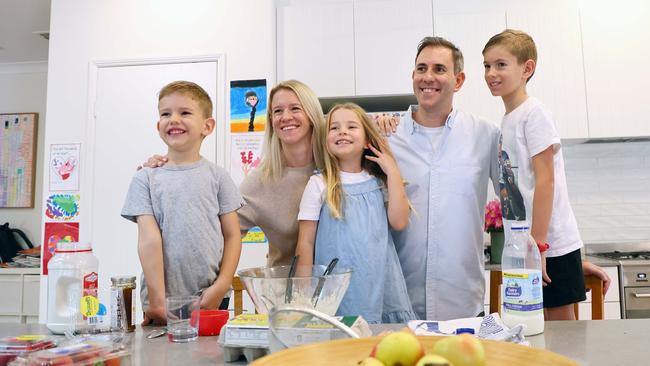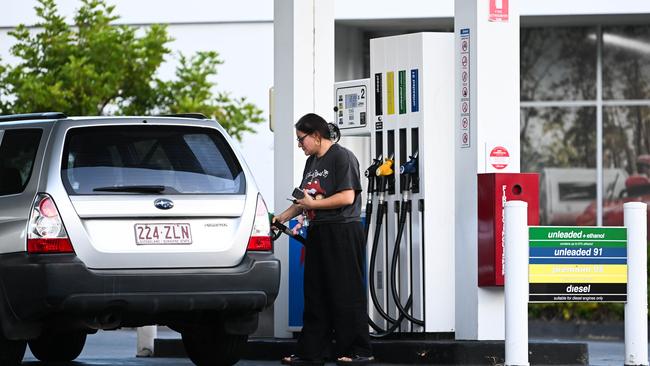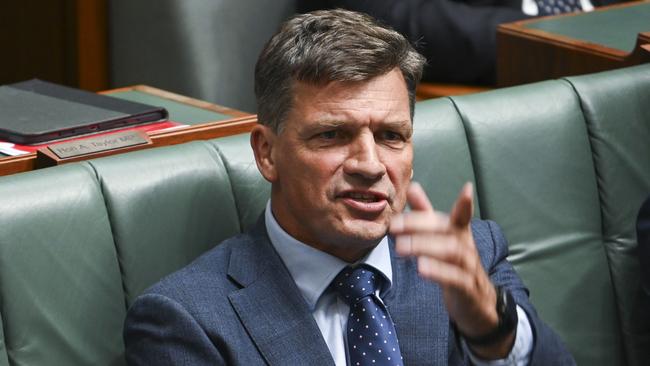Gross debt to climb to $1 trillion as Chalmers outlines costings of super on parental leave plan
In a media blitz on Sunday morning, Treasurer Jim Chalmers has flagged key measures that will form part of the May 14 budget.
Fed Budget
Don't miss out on the headlines from Fed Budget. Followed categories will be added to My News.
Australia’s gross debt is still predicted to rise above $1 trillion, Treasurer Jim Chalmers has flagged, as the Albanese government faces calls to deepen spending cuts to avoid exacerbating inflationary pressures.
Speaking three days out from the May 14 budget, the Treasurer did not rule out an increase in gross debt beyond $1 trillion, but argued that Labor’s economic credentials meant that Australia’s liabilities were lower than they otherwise would have been.
“We have saved so much debt by managing the economy much more responsibly than our predecessors,” Dr Chalmers told Sky News’ Sunday Agenda.
With a rapid improvement to the budget bottom line thanks to strong commodity prices and near record-low unemployment, Dr Chalmers said taxpayers would save approximately $80 bn in interest repayments over the next decade due to downgrades in government debt.

“We’ve got those debt levels down … about $150 bn lower than what we inherited from our predecessors,” he said.
According to 2023-24 budget papers, gross debt was predicted to surpass $1 trillion by the year to June 2026.
Gross debt reflects the amount of money owed by the government, primarily via the issuance of Commonwealth-backed securities.
Net debt, which is considered a better measure of the government’s ability to repay its liabilities, is the sum of gross debts minus its financial assets. On this measure, debt will climb to $575bn this financial year, according to the 2023-24 budget papers.
Interest repayments on government debt is the fastest growing expense on the federal budget, as record deficits from surging pandemic-era spending, were compounded by a sharp rise in interest rates across the world.
During his time in opposition, Dr Chalmers campaigned heavily on the rise in gross debt under the Coalition, arguing that taxpayers had received little value for money from the former government’s spending measures.
Super on PPL to cost “a bit north of” $600m a year
In an earlier interview, the Treasurer confirmed the costings of the Albanese government’s investment to pay superannuation on paid parental leave, slated to take effect from July 1, 2025.
Dr Chalmers said the initial outlay for the measure would be $1.1 bn over the four-year forward estimates period, with the cost of the policy then amounting to $623.1 m per year thereafter.
“It’s a really important investment. When mums or dads go on the government paid parental leave system, they shouldn’t be missing out on superannuation,” he told Nine’s Weekend Today.
The $623.1 m annual cost is sharply higher than Treasury estimates in 2020 which forecast an ongoing cost of $200 m a year, however this calculation assumed a superannuation guarantee of 9.5 per cent and 18 weeks of paid parental leave.
The increase to the superannuation guarantee, which will jump from 11.5 per cent in its first year to 12 per cent from July 2026, and the duration of the entitlement, which will climb from the original 24 weeks to 26 weeks in July 2026, have made the policy significantly more expensive than originally thought.
Robust wages growth has also added to costs

Dr Chalmers said the measure would help women in particular who had previously missed out on super while on parental leave.
“We recognise that when people are making difficult choices about whether to have kids, we need to support them with paid parental leave, which we’ve extended super on paid parental leave,” he said.
On Friday, Dr Chalmers, himself a father of three, flagged additional support in the budget for Australian families to have more children if they wished.
Australia’s recent surge in population growth, buoyed by a soaring migration intake, has become a hot button political issue, and has led to calls for the government to bolster natural population growth rather than solely rely on international arrivals.
The Treasurer said other measures designed to help families included billions of dollars for early childhood education and care.
Fuel excise cut off the table: Chalmers
Amid calls for the Albanese government to provide additional relief to motorists, Dr Chalmers said the budget would not “chase the petrol price up and down” via a temporary cut to the fuel excise.
The focus would instead centre on a suite of other cost of living measures which would act as less of a drag on the budget bottom line.
“We want to help motorists because we know that they’re under pressure, but we just think that there are more effective ways to do that elsewhere in the budget, rather than the sort of multi-billion dollar outlays we’ve seen in the past when it comes to the petrol excise,” Dr Chalmers told Sky News.
The fuel excise is a tax levied by the federal government on petrol and diesel bought at the bowser. Motorists currently pay 49.6 cents in excise for every litre of fuel they purchase.
Petrol costs, which form a large component of household budgets, have swung sharply higher in recent weeks, with the national retail average climbing to $2.07 a litre on most recent measures by the Australian Institute of Petroleum.

The surge at the bowser has in turn pushed headline inflation to 3.6 per cent in the year to March, reducing the odds of rate cuts until well into 2025.
Last week, Reserve Bank governor Michele Bullock warned that elevated fuel costs would act as a major driver on price pressures in coming months, with little relief at the bowser in sight.
“The inflation forecast in the next little while is going to be quite driven by petrol prices,” Ms Bullock said on Tuesday.
Elevated crude oil prices, which are sitting at approximately $US83 a barrel due to growing global demand and OPEC+ supply cuts, and a lack of competition between service stations are being blamed for the higher prices.
In September 2022, Labor allowed a 22c cut to the petrol excise to expire, arguing that the measure would cost the budget as much as $1bn a month.
A temporary six-month reduction in the excise was announced in the 2022 March budget by the former Morrison government, as part of a pre-election cost of living package.
Coalition skeptical on Labor’s inflation pledge
Australians will ultimately experience an escalation in cost of living pressures if Tuesday’s federal budget fails to dampen inflation, shadow treasurer Angus Taylor has argued.
Also speaking on Sunday, Dr Chalmers opposition counterpart called on the Treasurer to reduce spending by re-establish fiscal guardrails adopted by former treasurer Peter Costello during the Howard government.
“To do that, they have to re-establish the fiscal rules that Peter Costello put in place back in the 1990s to have a structural budget balance, making sure the economy grows faster than spending,” Mr Taylor told the ABC.

“That’s not what we’ve been seeing … We’re proposing to put those back in.
“This is a very important policy change. Labor took them out when they came into government.”
Mr Taylor claimed that Dr Chalmers two previous budget had failed to relieve inflationary pressures.
“They haven’t delivered this cut in inflation, the home-grown inflation that we’ve seen under Labor, described as home-grown inflation by the Reserve Bank governor by the way,” he said.
“If we have another flop in this budget, Australians will pay a high price.”
Mr Taylor accused the Albanese government of spending an additional $209bn since it had come to office, much of which includes the indexation of government payments.
Originally published as Gross debt to climb to $1 trillion as Chalmers outlines costings of super on parental leave plan




